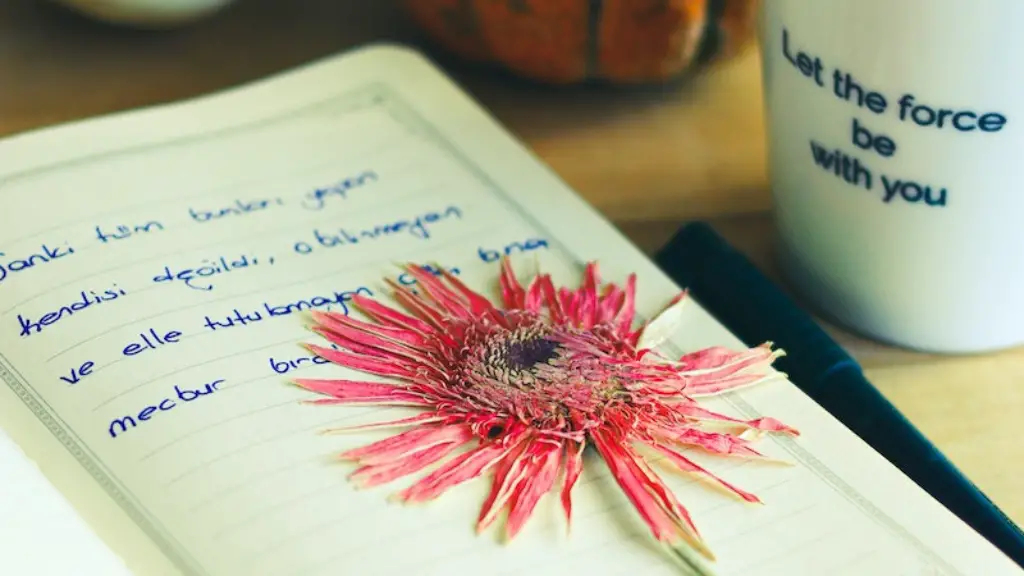1. Break Through Writers Block
Writing poetry can be a challenge and getting back into it can be even more daunting. The first step is to break through writer’s block. Writers block is a mental block where you don’t have access to your normal creative flow. This can be caused by a number of things such as lack of focus, being overwhelmed and feeling discouraged. To break through this block, it is important to focus on the creative process instead of the outcome. Take some time off to relax and gather inspiration, such as reading other poetry or exploring an art gallery. When you are feeling inspired and ready to write, keep a journal handy to jot down ideas as they come to you. Additionally, do not get too caught up in specifics and self-editing; allow yourself to be creative and write freely without being too critical.
2. Find Your Voice
Poetry is a personal form of expression and everyone has their own unique style. To create compelling poetry, it is important to find your own writing voice. Start by exploring different genres and forms of poetry such as haikus, sonnets, and epics. Reading poetry from different authors can be a great way to find inspiration and gain an understanding of the different styles. For added inspiration, try writing in free verse or create poetry influenced by a favorite artist or writer. As you become more comfortable with your poetic voice, practice writing every day. This consistent practice will help you stay inspired and gain confidence in your writing.
3. Connect With A Community
Writing poetry can be a solitary activity, but connecting with other writers can help keep creativity alive. Joining a poetry group or workshop is a great way to get feedback on your work and gain insight from others. It can help to join a community or workshop with people who have a similar interest in writing poetry. This helps create an environment of mutual support and collaboration. Additionally, participating in writing competitions is an excellent way to receive constructive feedback and to keep pushing yourself to develop as a poet.
4. Submit Your Work
Once you have gained confidence in your writing, submitting your work for publication is the next step. Finding journals or publications that are a good fit for your style of poetry is essential. You can find various poetry journals by doing a quick online search or asking a mentor or professor. Additionally, searching for calls for submission on social media or websites can be a great way to find new opportunities. When submitting your poetry, make sure to read their guidelines and follow formatting instructions. Rejection is a part of the publishing process, so don’t be discouraged by rejections. Instead, use the feedback to improve your poetry and keep submitting.
5. Nurture Your Talent
Writing poetry is a form of art and, like other art forms, requires practice and dedication. It is important to nurture your talent and develop a routine to maintain creativity. A daily practice of writing, reading other poets, and listening to music can help keep inspiration alive. To stay motivated, celebrate your accomplishments and reward yourself for each milestone. You can also challenge yourself by setting writing goals, such as a number of lines or amount of words to write each day. Using the Pomodoro technique or attending a writing retreat can also help get back in the habit of writing poetry.
6. Read Poetry From Different Eras
While exploring diverse forms and styles of poetry, it is important to read poetry from different eras. Reading poetry from different periods can help you gain an understanding of how poetry pieces are developed and how they reflect different aspects of culture. Additionally, analyzing poetry from different eras helps to recognize different poetic forms and understand their conventions. By reading older poetry, you can gain inspiration and widen your own poetic horizons, as well as recognizing influential poets from the past.
7. Make Writing A Habit
Writing poetry can be a great way to express yourself, tell stories, and find your voice. To consistently write strong poetry and get back into the habit of writing, it is important to make writing a priority. Start by setting aside specific times to write and be consistent with your approach. Whether it is a few minutes or an hour, the important thing is that you focus on the creative process. Additionally, try to establish a writing environment that is comfortable and free of distractions. Having a designated writing space can help you stay focused and productive.
8. Experiment With Different Genres
Poetry can encompass many different genres and is ever-evolving. To find new inspiration and gain knowledge, experimenting with different genres of poetry is a great way to grow as a writer. Focusing on one specific genre and style of writing can be constraining. Therefore, exploring different styles of poetry, such as spoken word and rap, can broaden your understanding and keep you motivated to write. Incorporating different genres can help you discover even more ways to express yourself in the form of poetry.
9. Utilize Technology
Technology can be an incredibly useful tool for creating and sharing poetry. Using specialized software such as Adobe Creative Suite or interactive platforms like WordPress can help make writing more efficient and accessible. Additionally, many online platforms are dedicated to helping poets share their work with a larger audience. Many established websites, such as Poem Hunter and All Poetry, have online communities dedicated to sharing poetry. This can be a great way to gain exposure and help build your portfolio.
10.Ask For Support
Poetry is an art form that requires discipline and dedication, so do not be afraid to ask for help and support. Trying to break through writer’s block or finding your voice can be an intimidating journey, so it is important to know where to find support. Seeking advice or feedback from a mentor or an experienced poet can be a great way to gain insight and find confidence in your writing. Additionally, having someone to talk to who is also passionate about poetry and can relate to your struggles can be incredibly beneficial.
11. Adapt Techniques Of Experienced Poets
As a poet, it can be helpful to adapt techniques from experienced poets. Experimenting with language and structure can be a great way to find new ways to express yourself. Try writing and recording a poem in the style of your favorite poet or creating a protective writing “bubble” by using a poem from a particular poet as a launching point. Additionally, mimicking the sound and rhythm of a particular poet can help break through writers block and gain a better understanding of a particular style.
12. Analyse Your Writing
Constantly analyzing and revisiting your writing is an essential part of becoming a great poet. Taking the time to review your work and gain objective feedback can help you learn and improve. After writing a poem, let it sit for a few days before coming back to it and reading it aloud. Additionally, have your work read by someone else who can provide constructive criticism. Revision is a helpful tool for any poet; finding the right approach and techniques for it is important for growth and progression.
13. Don’t Give Up
Finally, do not give up. Being a poet is a process of continual progress and understanding. Writing a great poem can be a hard task and not every piece will be perfect; however, it is important to remember that practice makes perfect. Keep challenging yourself and be confident in your writing. Taking creative risks and accepting criticism can be difficult, but it is essential for growth as a poet. So stay motivated and do not give up.



